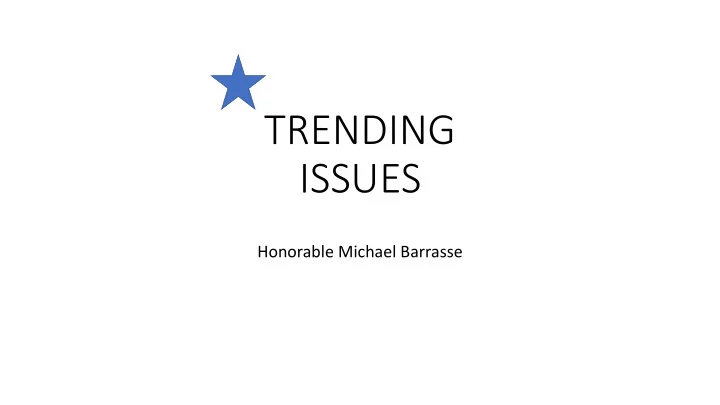

TRENDING ISSUES Honorable Michael Barrasse
Massachusetts v. Eldred
Eldred • Argued before Supreme Judicial Court of Massachusetts in Oct. 2017 • Briefs available online at: http://www.ma.appellatecourts.org • Docket number SJC-12279
Eldred • 8/22/16: Defendant convicted of larceny of property > $250 • 8/22/16: Defendant sentenced to one year probation — conditions included: • Remain drug fee • Submit to random drug tests
Eldred • 8/24/16: Defendant undergoes D&A assessment, prescribed suboxone • 8/29/16: Defendant begins IOP
Eldred • 9/2/16: Defendant meets with probation officer, urine screen tests positive for fentanyl and suboxone. • Probation officers suggests inpatient treatment, defendant refuses • 9/2/16 is Friday prior to Labor Day • PO concerned about risks of fentanyl detox, files detainer and defendant detained.
Eldred • 9/2/16: Defendant meets with probation officer, urine screen tests positive for fentanyl and suboxone. • Probation officers suggests inpatient treatment, defendant refuses • 9/2/16 is Friday prior to Labor Day • PO concerned about risks of fentanyl detox, files detainer and defendant detained.
Eldred Issue • “ May the probationer permissibly be required to ‘remain drug free’ as a condition of her probation, and may she permissibly be punished for violating that condition, when the probationer suffers from SUD, and where her continued use of substances despite negative consequences is a symptom of that disorder?”
Eldred-Constitutional Issues • Robinson v. California, 370 U.S. 660 (1962) • Powell v. Texas, 392 U.S. 514 (1968).
Robinson v. California (1962) • California statute criminalized being under the influence of narcotics except with a prescription. • First use of “cruel and unusual punishment” ban of Eighth Amendment to analyze conduct statute criminalizes rather than form of punishment
Robinson v. California • A majority of the court held that punishing person for a medical condition violates the Eighth Amendment ban on cruel and unusual punishment
Powell v. Texas (1968) • Texas statute criminalized public intoxication. • Challenge based on Robinson analysis of Eighth Amendment. • Four justices concluded that the defendant was convicted, not for being a chronic alcoholic, but for being in public while drunk on a particular occasion.
Powell v. Texas • Two of the four noted the impact of striking down the statute on state’s efforts to deal with a widespread and important social problem. • A fifth justice wrote that there was no constitutional violation • Four justices dissented, citing Robinson.
Defendant’s Contentions • Defendant suffers from severe SUD, a chronic brain disease marked by the compulsive use of a substance despite negative consequences. • Relapse is a symptom of the disorder. • Defendant’s SUD left her powerless to exert control over the compulsions to use opioids despite the negative consequences.
Defendant’s Contention • Because of defendant’s SUD, defendant’s noncompliance with the “remain drug - free” condition cannot be said to be “willful” and therefore the revocation should be set aside. • The science is settled that SUDs are a disease of the brain
Prosecution Contention • The record is inadequate to determine defendant’s fact dependent constitutional claim. • Case submitted on affidavits — no opportunity to cross examine. • Defendant’s argument rests on a false dichotomy between addiction as purely a disease and addiction as a moral failing.
Prosecution contention • A better view of addiction is more nuanced, encompassing biological, social, and behavioral components. • Drug free conditions and testing are essential for effective treatment. • Defendant is being punished for larceny, not for her condition.
Multiple “Friend of the Court” Briefs • Massachusetts Medical Society • ACLU • 11 Addiction Experts • National Association of Drug Court Professionals
Mass. Medical Society • There is a consensus within the medical community, locally, nationally and internationally, recognizing SUD as a disease of the brain. • It is a chronic neurological disorder and needs to be treated as other chronic neurological conditions are .
Mass. Medical Society • Punishing relapse without considering the clinical course of SUD, which is characterized by repeated substance use despite destructive consequences, physical dependence, and difficulty abstaining notwithstanding the user’s resolution to do so, will not effectively accomplish the intended goal of deterrence. • Relapse is a feature of SUD, and the risk of relapse continues throughout the course of treatment • Stress caused by requirement to remain asymptomatic compounds risk of relapse.
Mass. Medical Society • Imposing punitive sanctions for relapses in cases such as this may proliferate the crisis. • Punitive sanctions based on relapse alone not shown to be a deterrent. • Punitive sanctions undermine public health by reinforcing stigma.
Eleven Experts • The characterization of addiction as a brain disease is scientifically, clinically, and conceptually contested. • Efforts to position addiction as a “brain disease” were intended to persuade politicians and society to take the problem seriously other than as a moral failure.
Eleven Experts • The brain disease model had been effective in de- stigmatizing schizophrenia. • One expert say the adoption of the brain disease model as a tactical triumph but a scientific setback.
Eleven Experts • Brain changes ≠ brain disease • Brain changes ≠ involuntariness • Addicts retain the capacity to choose to refrain and do respond to incentives and sanctions • The case has profound criminal justice implications and shouldn’t be decided on contested concepts and science.
NADCP • The court should not allow any particular theory of addiction to influence its decision. • The combination of treatment, testing, and sanctions used in drug courts is both highly successful and flexible enough to adapt to new scientific developments.
NADCP • Broad agreement that criminal justice approach combines treatment, drug testing, and supervision, including sanctions and incentives. • Individuals with SUD retain the ability to exercise free choice.
Trending Issue • Annals of Research and Knowledge on Effective Justice Programming • National Drug Court Institute • www.ndci.org
Recommend
More recommend